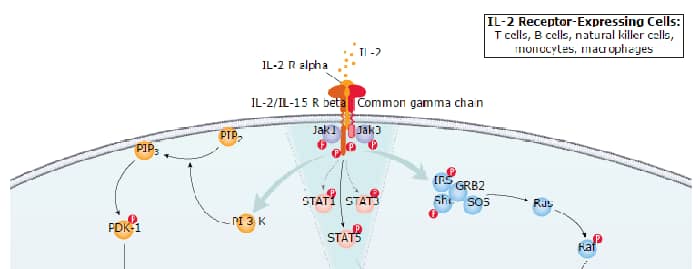Canine IL-2 Biotinylated Antibody Summary
Ala21-Thr155 (Cys147Ser)
Accession # Q29416
Applications
Canine IL-2 Sandwich Immunoassay
Please Note: Optimal dilutions should be determined by each laboratory for each application. General Protocols are available in the Technical Information section on our website.
Scientific Data
 View Larger
View Larger
IL‑2 in Canine PBMCs. IL-2 was detected in immersion fixed canine peripheral blood mononuclear cells (PBMCs) untreated or treated with calcium ionomycin and PMA using Goat Anti-Canine IL-2 Biotinylated Antigen Affinity-purified Polyclonal Antibody (Catalog # BAF1815) at 15 µg/mL for 3 hours at room temperature. Cells were stained using the NorthernLights™ 557-conjugated Streptavidin (red; Catalog # NL999) and counterstained with DAPI (blue). Specific staining was localized to cell secretion. View our protocol for Fluorescent ICC Staining of Non-adherent Cells.
Reconstitution Calculator
Preparation and Storage
- 12 months from date of receipt, -20 to -70 °C as supplied.
- 1 month, 2 to 8 °C under sterile conditions after reconstitution.
- 6 months, -20 to -70 °C under sterile conditions after reconstitution.
Background: IL-2
Interleukin 2 was initially identified as a T cell growth factor that is produced by T cells following activation by mitogens or antigens. Since then, it has been shown that IL-2 can also stimulate the growth and differentiation of B cells, natural killer (NK) cells, lymphocyte activated killer (LAK) cells, monocytes/macrophages, and oligodendrocytes. The biological activity of IL-2 is mediated by the binding to cell surface receptor complexes composed of three subunits designated as alpha, beta, and gamma subunits. IL-2 binds the alpha subunit with low affinity. The functional high affinity IL-2 receptor is a heterotrimeric complex of the alpha, beta, and gamma subunits. IL-2 binds with intermediate affinity to the complex containing the beta and gamma subunits, which is also capable of transducing IL-2 signals. In T cells, the beta and gamma subunits are shared with the IL-15 receptor complex. The gamma subunit of the IL-2 receptor complex has also been shown to be a subunit of the receptor complexes of IL-4, IL-7, and IL-9. At the amino acid sequence level, canine IL-2 shares 90%, 86%, 85%, 76%, and 75% sequence similarities to feline, human, equine, mouse, and bovine IL-2, respectively.
Product Datasheets
Citations for Canine IL-2 Biotinylated Antibody
R&D Systems personnel manually curate a database that contains references using R&D Systems products. The data collected includes not only links to publications in PubMed, but also provides information about sample types, species, and experimental conditions.
2
Citations: Showing 1 - 2
Filter your results:
Filter by:
-
Bathing effects of east saline groundwater concentrates on allergic (atopic) dermatitis-like skin lesions induced by 2,4-dinitrochlorobenzene in hairless mice
Authors: CG Kim, JE Lee, DG Jeong, YH Lee, SI Park, DG Lee, CH Han, SJ Kang, CH Song, SH Choi, YJ Lee, SK Ku
Exp Ther Med, 2017-04-27;13(6):3448-3466.
Species: Mouse
Sample Types: Whole Tissue
Applications: IHC -
Effects of oral cyclosporine on canine T-cell expression of IL-2 and IFN-gamma across a 12-h dosing interval
Authors: C. L. Fellman, T. M. Archer, J. V. Stokes, R. W. Wills, K. V. Lunsford, A. J. Mackin
Journal of Veterinary Pharmacology and Therapeutics
FAQs
No product specific FAQs exist for this product, however you may
View all Antibody FAQsReviews for Canine IL-2 Biotinylated Antibody
There are currently no reviews for this product. Be the first to review Canine IL-2 Biotinylated Antibody and earn rewards!
Have you used Canine IL-2 Biotinylated Antibody?
Submit a review and receive an Amazon gift card.
$25/€18/£15/$25CAN/¥75 Yuan/¥2500 Yen for a review with an image
$10/€7/£6/$10 CAD/¥70 Yuan/¥1110 Yen for a review without an image









